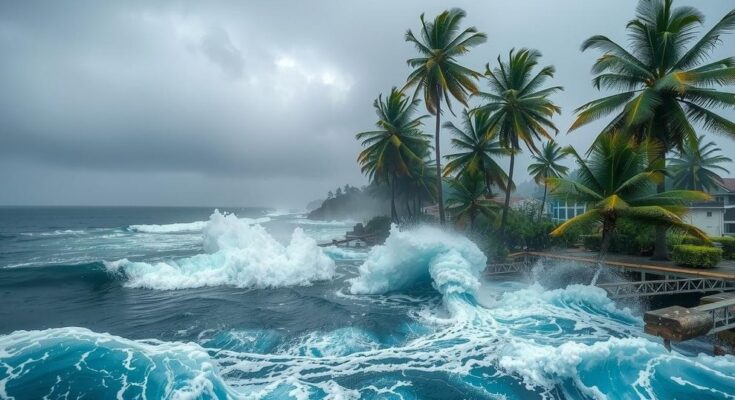Cyclone Chido has devastated Mayotte, resulting in at least 22 confirmed deaths and thousands potentially missing. Research reveals climate change intensified the storm, raising severity and likelihood of occurrence. Political ramifications in France stem from perceived management failures, as ongoing concerns about vulnerable populations and climate-related disasters highlight systemic issues in preparedness. The crisis reflects pressing challenges posed by climate change, particularly for impoverished and undocumented communities.
Cyclone Chido has devastated Mayotte, with initial reports indicating at least 22 fatalities and over 1,400 injuries, as rescue efforts are hindered by the cyclone’s collateral damage. This storm, the deadliest to affect Mayotte in almost a century, exhibited unprecedented wind speeds over 200 kilometers per hour, leading to extensive destruction across communities. Authorities now face the imminent threat of hunger, disease, and lawlessness, further complicating the recovery process. The physical devastation has been compounded by the challenges posed by numerous undocumented residents possibly left unaccounted for.
Notably, research from Imperial College London attributes the intensity of Cyclone Chido to human-driven climate change, which has heightened the storm’s wind speeds and likelihood of occurrence. Dr. Nathan Sparks remarked that climate change has escalated Chido from a Category 3 to a Category 4 system, reinforcing the notion of increasing cyclone severity correlated with global warming. Dr. Friederike Otto highlighted the intersection of poverty and climate change, emphasizing the disproportionate suffering endured by vulnerable populations in regions like Mayotte. Furthermore, projections indicate that without a shift to renewable energy, the occurrence of such storms could surge by another 26% by the end of the century.
In the wake of this disaster, French political dynamics are strained, with criticisms directed at officials, including Prime Minister François Bayrou, for perceived inadequacies in crisis management. The calls for accountability extend to the government’s longstanding neglect of planning and resources directed towards overseas territories like Mayotte. Reports indicate that the early warning systems functioned adequately, yet unregistered migrants likely avoided shelters out of fear of deportation. This perceived lack of preparedness, alongside the call for urgent international action to address climate vulnerability, demonstrates the growing confrontation between political policy and environmental realities.
The ramifications of Cyclone Chido starkly illuminate the pressing challenges that climate change presents, particularly for underresourced and vulnerable communities. Mayotte’s situation serves as a poignant reminder of the multifaceted crisis at hand, linking extreme weather events to deeper socio-economic inequalities. As global temperatures rise, the need for immediate and sustainable responses to combat climate change becomes paramount, lest the cycle of disaster and political turmoil perpetuate further economic and social disarray.
In December 2023, Cyclone Chido struck the island of Mayotte, a French overseas territory, marking one of the worst natural disasters in the region in over ninety years. The cyclone brought catastrophic winds and destruction, resulting in significant loss of life and widespread infrastructural damage. The situation has been exacerbated by the presence of many undocumented migrants, complicating rescue and recovery efforts. The event has raised critical discussions around the impacts of climate change on natural disasters, regional governance, and socio-economic disparities. Recent studies, like those from Imperial College London, have offered insights into how climate change influences the frequency and intensity of hurricanes, indicating a correlation between human activities, climate warming, and extreme weather events. These developments underscore the need for systemic change to address both climate resilience and inequality, especially in regions least equipped to handle such crises.
The devastation wrought by Cyclone Chido in Mayotte underscores a dual crisis of natural disaster and socio-political vulnerability exacerbated by climate change. Climate research indicates that increasing temperatures are making powerful storms more likely, with dire implications for already underserved regions. As political leaders are scrutinized for inadequate responses, the imperative for addressing climate change through mitigation and adaptation strategies becomes clearer. Without substantial changes in policy and infrastructure, the cycle of disaster and inequality is likely to endure, with the poorest often suffering the most. This situation calls for immediate global attention to enable regions like Mayotte to confront their vulnerabilities fortified against the backdrop of climate change.
Original Source: www.euronews.com




